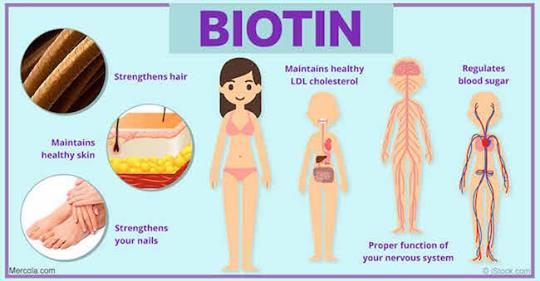Biotin (vitamin B7) is a water-soluble micronutrient which helps in energy production. Also known as Vitamin H or coenzyme R, biotin cannot be synthesized in the body and thus must be obtained from food. It plays a major role in remediating neurological disorders, hair loss and certain skin problems such as eczema and acne.
Signs and Symptoms of Biotin Deficiency
Biotin plays various roles in your body which include:
Helps in regulating blood sugar
Metabolizes carbohydrates, fats, and amino acids
Keeps LDL (LDL) in control
Enhances proper function of the nervous system
Maintains a healthy skin
Prevents age-related cognitive decline
Strengthens hair and reverses hair loss in collaboration with other enzymes
Strengthens the nails
Common Signs and Symptoms of Biotin Deficiency
Though not common like with other nutrients, biotin deficiency or insufficiency can occur. This is mainly because this micronutrient is water soluble and hence cannot be stored in the body. Thus, you should consistently take biotin in your diet to prevent deficiency.
If you have a biotin deficiency, the most common signs and symptoms may include:
Hair loss or thinning
Red and scaly rashes particularly on your face
Loss of appetite
Dry eyes
Nausea
Cracks in corners of the mouth
Depression
Muscle pain
Tingling or pricking (“needles and pins”) sensation
Typically, loss of hair and red and scaly rashes on your skin are the most common symptoms that indicate you need biotin. This is more important for pregnant mothers because biotin deficiency can adversely affect the growth and development of the fetus.
Causes of Biotin Deficiency
In reference to the Linus Pauling Institute at Oregon State University, biotin deficiency can result from:
Prolonged consumption of large number of egg white daily
Long-term use of antibiotics
Use of parenteral nutrition for a long time
Benefits of Biotin in Patients with Multiple Sclerosis
According to research, biotin can provide additional benefits in treating patients suffering from multiple sclerosis. This is in reference to Authority Nutrition. Multiple sclerosis occurs when the protective sheath (myelin) of nerve fibers in the eyes, spinal cord and brain become destroyed or damaged. Biotin plays an important role in the production of myelin. In a pilot study, 23 patients with progressive multiple sclerosis tested the use high amounts of biotin. Surprisingly, over 90% of the participants demonstrated some degree of clinical improvement. According to Multiple Sclerosis News Today, other randomized clinical trials are underway. The final results have not been published but the preliminary findings are promising.
Warning: Biotin Can Alter Thyroid Tests
Despite the benefits biotin provides to the body, dietary supplementation may present some shortcomings. According to a report in Endocrine News, biotin supplementation can alter the results of your thyroid tests. The results can either be false highs or lows. While the biotin tests can go back to normal when you stop supplementation, the results may not have anything to do with your thyroid. This is according to Dr. Cary N. Mariash, professor of clinical medicine at Indiana University in Indianapolis. Mariash says he has encountered several patients with abnormal thyroid test results after taking biotin.
Mismatched Results to Biotin Overdose
According to Dr. Carol Greenlee, an endocrinologist in Colorado, the ramifications of this test results can be cruel. Patients may be treated for hyperthyroidism, Graves’s disease or cancer while they don’t have a thyroid problem. It is simply because they are using large doses of biotin, which is altering the results. The blood samples contain large doses of biotin, which interfere with the process, rendering the results unusually high or low.
The Solution
To avoid mismatched results for a thyroid test, the solution is very simple. Biotin is water-soluble and usually flushes out of your body within a short time. You should simply stop using any biotin supplement at least 2 days before you go for the thyroid test. This will give accurate results. Biotin is not contraindicated for thyroid health because it does not alter your thyroid hormones but only alters the test results.
Natural Sources of Biotin
While the main concern is in high-dose biotin supplements, you can get biotin in many foods. Generally, there are two types of biotin in foods depending on the source. Free biotin is found in plants. Protein-based biotin is derived from animal foods. Both versions can be utilized by your body, but the free form is more readily absorbed because it doesn’t require conversion into a bioavailable form.
Free biotin sources include:
Lentils
Rice bran
Cooked oats
Bananas
Green peas
Sunflower seeds
Avocados
Pecans
Walnuts
Carrots
Mushrooms
Protein-bound biotin sources include:
Pasteurized/free-range or organic eggs
Organ meats such as kidney and liver
Dairy products such as raw, organic (grass-fed) milk, cheese or butter
Seafood (wild caught and not farmed)
